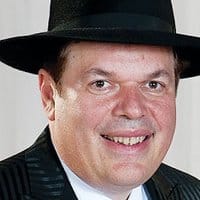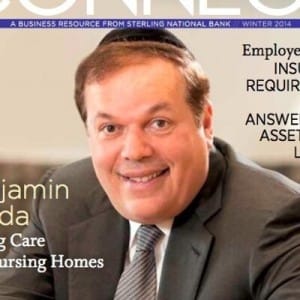It seems every time I check the news, some Jew in the nursing home business is getting attacked by government regulators and/or the media.
Why won’t the goyim leave us alone?
Chaim Amalek: “When my time comes I hope I will have the money to give to some torah yidden to take good care of me.”
The more successful you are, the more of a target you become.
Why do so many Torah Jews own/run nursing homes? I suppose that an education in Torah Judaism makes you more adept at navigating a legal system, such as the bureaucracy around senior care.
Not every Jew is smart enough to run a bank.
David Shirel with Shmuel Sackett, Ben Landa and Teddy Pollak
From ProPublica Oct. 27, 2015:
The state’s “character-and-competence” reviews are supposed to weed out operators with histories of violations and fines— but regulators don’t always act on the full story.
The nursing home is one of several in a group of for-profit homes affiliated with SentosaCare, LLC, that have a record of repeat fines, violations and complaints for deficient care in recent years.
Despite that record, SentosaCare founder Benjamin Landa, partner Bent Philipson and family members have been able to expand their nursing home ownerships in New York, easily clearing regulatory reviews meant to be a check on repeat offenders. SentosaCare is now the state’s largest nursing home network, with at least 25 facilities and nearly 5,400 beds.
That unhindered expansion highlights the continued weakness of nursing home oversight in New York, an investigation by ProPublica found, and exposes gaps in the state’s system for vetting parties who apply to buy shares in homes.
State law requires a “character-and-competence” review of buyers before a change in ownership can go through. To pass muster, other health care facilities associated with the buyers must have a record of high-quality care.
The decision maker in these deals is the state’s Public Health and Health Planning Council, a body of appointed officials, many from inside the health care industry. The council has substantial leverage to press nursing home applicants to improve quality, but an examination of dozens of transactions in recent years show that power is seldom used.
Moreover, records show that the council hasn’t always had complete information about all the violations and fines at nursing homes owned by or affiliated with applicants it reviewed. That’s because the Department of Health, which prepares character-and-competence recommendations for the council, doesn’t report them all.
By Michael Amon and Ridgely Ochs
Sept. 23, 2007 p.A4 to A8
Faced with a crisis over complaints about its treatment of Filipino nurses, Long Island nursing home group SentosaCare turned for help last year to a friendly politician it had supported in the past — Sen. Charles Schumer.The Democratic senator then wrote four letters over the course of two months to Philippine government officials, including President Gloria Macapagal-Arroyo. They asked the officials to meet with SentosaCare’s executives or to “consider reviewing” the Woodmere company’s case after the country suspended the company’s affiliated recruitment operation. Macapagal-Arroyo’s former chief of staff said the Schumer letters were unprecedented.
Shortly after two Schumer letters sent the same day, the Philippine government lifted the suspension. SentosaCare’s Filipino recruitment pipeline was back in business. Over the next two months, a national campaign fund headed by Schumer received nearly $75,000 from investors, attorneys and vendors for SentosaCare-affiliated nursing homes.
The involvement of New York’s senior senator triggered a storm of controversy 8,500 miles away in the Philippines that also has reached Long Island. Amid the dispute, Suffolk County District Attorney Thomas Spota agreed to meet in private with SentosaCare’s principals and their lawyer. They asked him to investigate the 10 nurses at a Smithtown nursing home who were among 26 who prompted the uproar when they resigned abruptly from SentosaCare facilities in New York City and Long Island.
An investigation followed immediately, and 10 months later the Smithtown nurses were charged for endangering patients when they quit without notice. The indictment is apparently the first of its kind in the state.
Joseph Berger writes for the New York Times Jan. 27, 2008:
THEY are recruited in their homeland with perks like free airfare. Some have been offered thousands of dollars in bonuses to relocate. And in the process, they have become a mainstay of the New York area’s hospitals and nursing homes.
They are nurses from the Philippines, and they are highly prized here because they speak English, are trained in American-caliber medicine and enjoy a reputation for tender care — the legacy of a society in which families tend to their own sick and aging relatives.
“We’re honest, industrious and don’t complain a lot,” explained Elmer Jacinto, 32, a registered nurse.
His voice, however, carried a palpable note of sarcasm. He and nine other Filipino nurses on Long Island did complain, and now they find themselves caught in what he called “a nightmare” — a disturbing new chapter in the upbeat story of one of this nation’s most successful immigrations.
The 10 nurses are under indictment in Suffolk County on charges of endangering the welfare of five chronically ill children and one terminally ill man. They are accused of walking off their jobs at the Avalon Gardens Rehabilitation and Health Care Center in Smithtown in April 2006 without providing sufficient notice for the nursing home to replace them on coming shifts.
Although their resignations were prompted by a seemingly commonplace dispute with their employers over what the nurses say were broken promises and shabby working conditions involving a total of 26 Filipino nurses and a physical therapist, the 10 defendants could each be sentenced to a year in jail and lose their nursing licenses….
The case has drawn wide attention and outrage in the Philippines, where legislators have held hearings into how the nurses were treated by the company that recruited them. Filipinos there and in the United States have rallied to support the nurses, joined by the American Nurses Association, which has said in a statement that “the real patient endangerment lies in the deplorable conditions that led the nurses to leave.”
The pushback has even taken on a political tinge. Commentators in both countries, citing an investigation by Newsday, have questioned whether favoritism was shown the nursing home owners because of their political influence and campaign contributions, and because of letters written to the Philippine president and other officials by Senator Charles E. Schumer. The senator and the owners have denied exerting any unusual pressure.
But what no one denies is that the case is a startling anomaly in what has been a remarkably successful migration of people seeking to work in a single occupation. More than half of American nurses trained abroad are from the Philippines, and they alleviate a perennial shortage of nurses in this country.
Of the New York area’s 215,000 Filipinos, 3 out of 10 work as nurses or other health-care practitioners, according to an analysis of Census Bureau data by Susan Weber-Stoger, a Queens College demographer. Many of the rest are their spouses, children or aging parents. That migration explains the large colonies of Filipinos in places like Jersey City and Bergenfield, N.J., a middle-class suburb, where Robert C. Rivas, mayor from 1999 to 2003, claimed to be the only Filipino mayor in the Northeast.
The indicted nurses pose a strange counterpoint to that success: the image of highly educated legal immigrants complaining about being exploited as green, overly trusting newcomers….
MR. Jacinto, a soft-spoken native of a small Philippines island, saw medicine as his ticket out of poverty. He not only received a nursing degree, but also graduated from medical school in the Philippines in 2004 with stellar board scores.
Deciding to leave one’s homeland is always wrenching, but American salaries were a large incentive. “You can earn here $3,000 a month in America while a doctor in the Philippines earns $400 a month and a nurse $200,” Mr. Jacinto said.
He came to New York in November 2005 with 21 other nurses who had been recruited by a Filipino agency that works mainly for SentosaCare, a network of 16 nursing homes with headquarters in Woodmere, N.Y., and operated by Benjamin Landa of Brooklyn and Bent Philipson of Monsey, N.Y. Mr. Landa owns eight other homes independently, and together with SentosaCare, the network of 24 homes has more than 5,000 patients and 5,000 employees. The 22 nurses who came over here in November 2005 say they were promised they would earn the same pay as American nurses and would quickly receive green cards giving them the status of permanent residents.
But Mr. Jacinto says he soon got some surprises: for two months, he was paid as a clerk, at a salary far below that of a nurse. It took more than half a year to get the green card. And he was not assigned to the SentosaCare-affiliated home in Queens that had sponsored his entry, but to Avalon, 40 miles east.
For weeks, he said, he slept on a couch in a frigid living room of a nurses’ staff house in Smithtown where the only toilet was frequently clogged. When he finally received nurses’ pay, he said, it was $24 an hour instead of the $34 that federal law requires immigrant nurses be paid to prevent undercutting of American workers’ salaries. He did not receive the same health insurance and workers’ compensation benefits as other nurses, he said, and was not paid for sick days or holidays.
Ms. Anilao said Avalon employed so few aides on the night shift that she regularly had to change soiled diapers and sheets and cart them away. The nurses complained that raises they were promised were wiped out by a reduction in work hours from 37.5 per week to 35.
Howard Fensterman, SentosaCare’s lawyer, denied that the nurses were mistreated or shortchanged, and rejected complaints that staffing was inadequate. SentosaCare, he said, had successfully employed 350 nurses from the Philippines over the years and had never experienced a wave of resignations.
The nurses say that when their complaints went unaddressed, they turned to the Philippines consulate in New York, which put them in touch with an immigration lawyer, Felix Vinluan. Mr. Vinluan concluded that their contract had been breached and on April 6, 2006, he filed a discrimination complaint with immigration officials in Washington. He also advised the nurses that one option was to resign.
BY MICHAEL AMON AND RIDGELY OCHS
Sept. 23, 2007 p. A7
Benjamin Landa and Bent Philipson have built the largest nursing home network in the state with good timing, smart business moves and the right contacts.In 1987, Landa bought his first nursing home – a facility in Far Rockaway – from his late father’s estate. A few years later, as he acquired more nursing homes, he started raising money for political candidates from both major parties. By 1994, he was a top fundraiser for future Gov. George Pataki said Jeffrey Weisenfeld, a former Pataki aide.
Then in 1996, Pataki named Landa to the Public Health Council, a state board with broad powers to approve health care facility projects, including nursing homes. That year, Landa teamed up with Philipson, who was a supervisor in one of his nursing homes.
During Landa’s eight-year tenure on the council, Landa,Philipson or their wives secured the purchase of 20 nursing homes and became the state’s leading players in the nursing home industry. They now run 25 facilities.
“Their approach is new,” said Neil Heyman, president of the Southern New York Association, a trade group of 64 nursing homes. He added that nursing homes in New York historically had been family run businesses. “They are part of a general trend toward giving nursing home organizations corporate names and structures.”
SentosaCare does not own or run the facilities, which have about 80 investors with Landa, Philipson or their spouses as the common denominator. Rather, the company centralizes administrative functions and provides a brand-name marketing tool.
Their strategy is the only way to, in effect, form a nursing home chain in New York state, said health care experts. Legislation passed after Medicaid fraud and patient abuse scandals in the 1970s required all nursing home investors to be vetted by the state. The laws essentially banned publicly-traded nursing home chains because of the impossibility of vetting thousands of investors behind publicly traded companies.
As the group grew, many nursing home owners said Landa’s council position and friendship with Pataki helped his projects.



